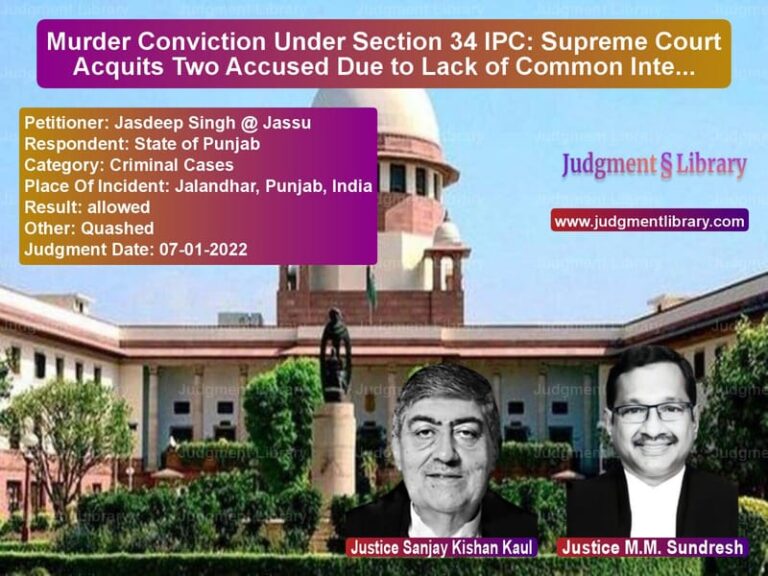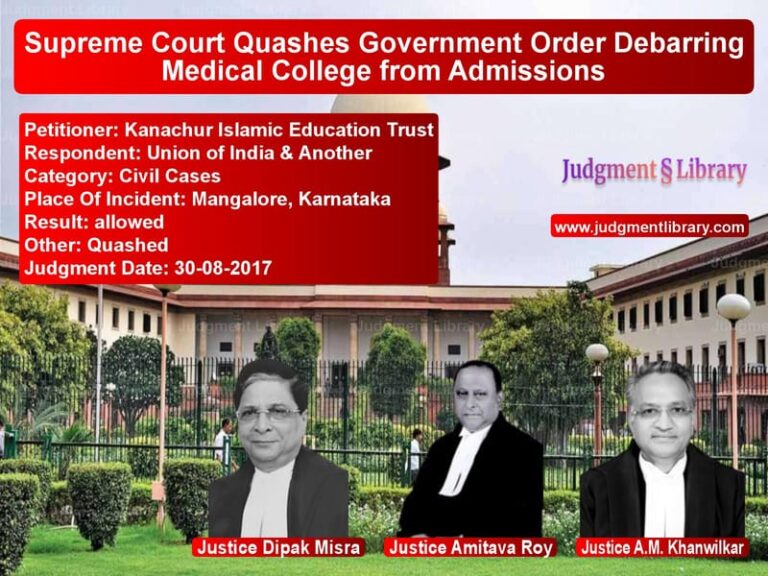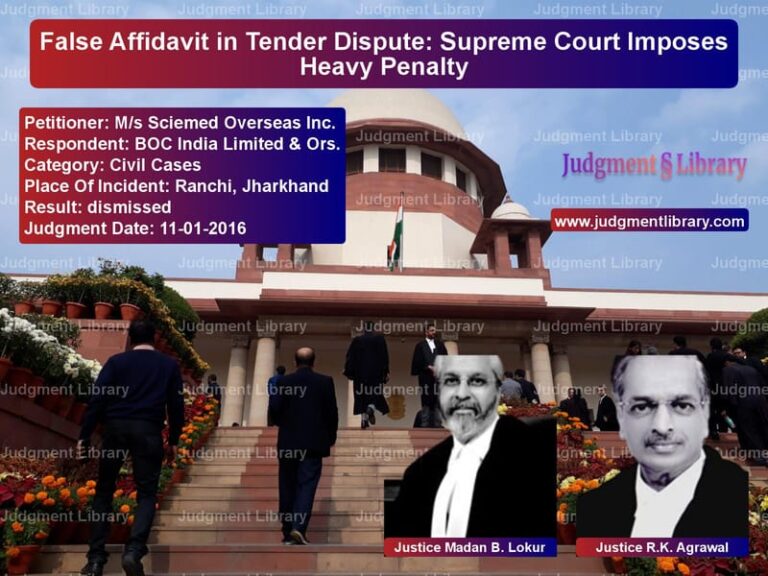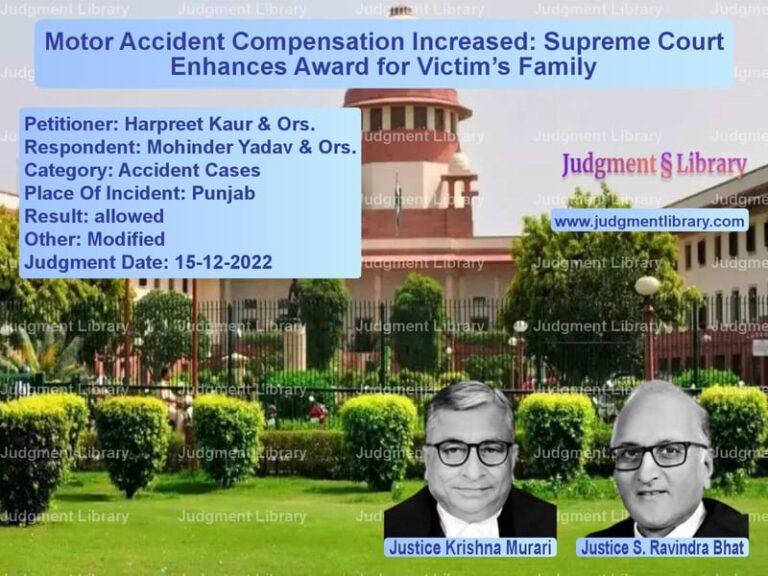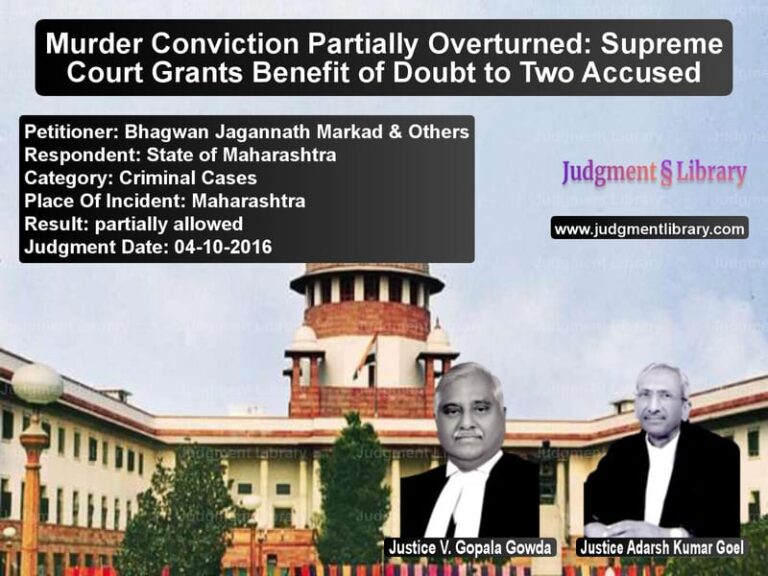Legal Battle Over Property Will: Supreme Court Restores Revocation of Letters of Administration
The case of Jai Ram vs. Som Prakash & Anr. revolves around a long-standing dispute over the inheritance of a property based on conflicting wills. The Supreme Court had to decide whether the revocation of Letters of Administration granted in favor of Som Prakash should be upheld or set aside. The judgment clarifies key aspects of the Indian Succession Act, 1925, the applicability of limitation laws, and the importance of due diligence in probate proceedings.
Background of the Case
The dispute concerns a single-story building situated at Bagh Rao Ji, Double Phatak Road, Delhi. The original owner, Satwanti Devi, had no direct heirs and executed multiple wills in favor of different individuals.
The key timeline of events is as follows:
- 1991: Satwanti Devi executed a registered will in favor of her nephew, Som Prakash.
- 1995: This will was revoked through a registered revocation deed.
- 1996: A new will was executed in favor of Jai Ram, a tenant in the property.
- 1996 (December 30): Satwanti Devi passed away.
- 1997: Som Prakash filed a suit for permanent injunction against Jai Ram but later withdrew it.
- 1997: Jai Ram filed a probate petition based on the 1996 will, but it was dismissed for default.
- 1997: Som Prakash filed a separate probate petition based on the 1991 will.
- 1999: The District Judge granted Letters of Administration in favor of Som Prakash.
- 2008: Som Prakash sold the property to Raj Kumar Choudhary.
- 2009: Raj Kumar Choudhary filed a civil suit for possession, which was decreed ex-parte against Jai Ram in 2012.
- 2013: Jai Ram discovered the Letters of Administration and filed an application to set aside the ex-parte decree.
- 2017: The District Judge revoked the Letters of Administration granted in 1999, citing the revocation of the 1991 will.
- 2018: Som Prakash challenged the revocation before the Delhi High Court.
- 2022: The High Court ruled in favor of Som Prakash, holding that Jai Ram’s application was time-barred under Article 137 of the Limitation Act.
- 2025: The Supreme Court restored the District Court’s decision, holding that the High Court erred in considering limitation without prior objections being raised.
Petitioner’s Arguments (Jai Ram)
The counsel for Jai Ram contended:
- The High Court was wrong in setting aside the District Court’s order of revocation.
- There was no objection raised regarding limitation during the initial proceedings.
- Had the limitation issue been raised earlier, the District Court would have examined it, and evidence would have been presented.
- Since the issue of limitation was a mixed question of law and fact, it could not be raised for the first time in appeal.
Respondent’s Arguments (Som Prakash)
The respondents argued:
- Even though the limitation issue was not raised at the trial court, it was the court’s duty to consider it.
- The application under Section 263 of the Indian Succession Act, 1925 for revocation of probate was filed too late.
- Under Article 137 of the Limitation Act, 1963, the application was time-barred.
- Since the Letters of Administration were granted in 1999, and the challenge was made in 2016, there was an unexplained delay.
Supreme Court’s Observations
The Supreme Court carefully examined the records and concluded:
- There was no prior objection regarding limitation during trial.
- If the limitation issue had been raised before the District Court, the parties would have led evidence on the matter.
- The High Court had incorrectly set aside the District Court’s order without considering that the limitation issue was never raised earlier.
- Since no limitation plea was taken in the lower court, it could not be introduced for the first time in appeal.
- The High Court should have decided the appeal on merits instead of dismissing it on limitation grounds.
Final Judgment
The Supreme Court:
- Set aside the High Court’s judgment.
- Restored the District Court’s order revoking the Letters of Administration granted to Som Prakash.
- Directed the High Court to reconsider the appeal on merits without deciding on the limitation issue.
- Emphasized that all contentions regarding the validity of the wills and the inheritance dispute remain open for decision.
The Supreme Court ruled:
“In the absence of such a plea or evidence on the issue of limitation, the High Court could not have set aside the order of the District Court.”
Conclusion
This judgment highlights the importance of raising objections at the right stage of legal proceedings. The Supreme Court’s decision ensures that cases are decided on substantive merits rather than technicalities. The ruling reaffirms that courts should not introduce limitation objections for the first time in appeals, especially when no such plea was raised earlier.
With the case now remanded to the High Court, the final decision on the rightful owner of the property remains to be seen.
Petitioner Name: Jai Ram.Respondent Name: Som Prakash & Anr..Judgment By: Justice B.V. Nagarathna, Justice Satish Chandra Sharma.Place Of Incident: Delhi.Judgment Date: 03-02-2025.
Don’t miss out on the full details! Download the complete judgment in PDF format below and gain valuable insights instantly!
Download Judgment: jai-ram-vs-som-prakash-&-anr.-supreme-court-of-india-judgment-dated-03-02-2025.pdf
Directly Download Judgment: Directly download this Judgment
See all petitions in Succession and Wills
See all petitions in Property Disputes
See all petitions in Judgment by B.V. Nagarathna
See all petitions in Judgment by Satish Chandra Sharma
See all petitions in allowed
See all petitions in Remanded
See all petitions in supreme court of India judgments February 2025
See all petitions in 2025 judgments
See all posts in Civil Cases Category
See all allowed petitions in Civil Cases Category
See all Dismissed petitions in Civil Cases Category
See all partially allowed petitions in Civil Cases Category



